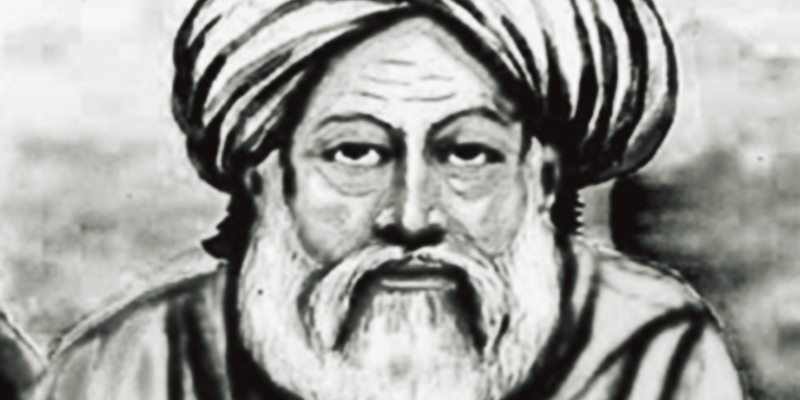Rumi Foundation brings out a ‘Sufi journal’ called Hu. This year two of my essays have been published in the journal. I am posting the first one on Bulleh Shah.
***
If God was found by bathing and cleansing
He would have been found by frogs and fish
If God was found by wandering in the jungles
Stray animals would have found him
O Bulleh, the Lord can only be found
By loving hearts true and pure
(Translation by author)
Fifteenth century India witnessed a spiritual-cultural synthesis that was navigated by hundreds of yogis, Sufis and poets of India. Very much a people’s mobilisation, the Bhakti movement articulated a powerful vision of tolerance, amity and co-existence that is still relevant today. The powerful and soulful voices of Sufi poets of the sixteenth century therefore sing a shared tune: of love, rejection of formal identities based on caste, organized religion and class.
Bulleh Shah (1680-1758) of Kasur in Central Punjab is an extraordinary voice that provided a mystical message beyond caste, institutionalized religion and ideologies of power. Born in 1860 and named Abdullah Shah in a Syed family, he found a Murshid (spiritual master) in Shah Inayat who was an Arain (traditionally a non-landowning group). Bulleh’s family disowned him for trampling his caste and therefore identity in the rural context. However, Bulleh Shah, driven by Sufi ideals of equality of humans, rejected the formalized social identity framework based on hierarchies. The quest for knowledge, and the thirst for spiritual completion what the masses perceive to be the domain of religion was a pursuit beyond these divisive and hereditary conceptions of formal religion. When the orthodoxy declared him as an infidel, Bulleh replied:
Tainoon kafar, kafar aakhdey
Tu aaho aaho aakh
They repeatedly call you a non-believer
Say yes, yes I am
Bulleh’s messages embodied in his poetry thus expose the nexus between the clergy and the rulers, the hollowness of rituals and the self-assumed role of the cleric that created a gulf between man and his Creator.
Mulla tay mashaalchi dohaan ikko chit
Loukan karday chananan, aap anhairae vich
Mullah and the torch-bearer, both from the same flock
Guiding others; themselves in the dark
Therefore, a common theme of his poetry is the self-realization, a pre-requisite for the mystical union with the Beloved.
Yes, yes, you have read thousands of books
but you have never tried to read your own self
you rush in, into your Mandirs, into your Mosques
but you have never tried to enter your own heart
futile are all your battles with Satan
for you have never tried to fight your own desires.
Bulleh Shah’s murshid Shah Inayat, belonged to the Qadriyya School: known for its close affinity with yoga and other meditative practices. On the limitations of organized rituals, Bulleh Shah’s said:
Demolish the Mosque, demolish the temple
Demolish everything in sight
But don’t (demolish) break a human heart
Since that is where the Almighty lives
The yearning for anonymity, and connecting with the Beloved, requires that there are no distractions, no castes and no illusions of attachment. Bulleh Shah’s verse and its translation say it so directly and passionately: he is neither bound to any city, nor to the ethnic compositions that create and dissipate within them.
If you can understand, then why all this commotion?
What’s this fuss about calling Him Ram, Rahim or Moula?
Bulleh’s verse, Ik nuktay wich Gal mukdee aye, echoes the intricate mosaic of subcontinental belief systems that place coexistence and unity of existence at the centre of human experience. This poem literally translated, On one point the matters ends elaborates this theme:
Catch the point, drop the academe
Push away divisions which blaspheme
Cast off hell, the grave, chastisement extreme
Cleanse out the heart’s every dream
Into this house everything descends
On the point the matter ends
Some to jungles, to the seas go
Some daily a single grain swallow
Without perception tiredness they stow
They return home emaciated, in imbroglio
Just in prayer-rigours life expands
On one point the matter ends
(Translation: Muzzaffar Ghaffar)
Nukta (literally dot) is a complex formulation. Nukta is also the centrality of Being not unlike the letter Alif that represents the all-encompassing universe. This is also a metaphor that the created beings also reflect the Creator. This unity of being that can be reduced to one infinite dot has all the answers humans spend their lives searching.
The inventive irreverence of Bulleh is always well calibrated and symbolic. For instance in one of the kaafis ( a short poem) dogs are a metaphor for an ideal Sufi:
They do not stop barking
and ultimately sleep on a dirty pile of waste
They are superior to you
They do not leave their master’s door even
if they are beaten by shoes.
Bulleh Shah! perform good deeds otherwise dogs will supersede you.
They are superior to you.
In Pakistan, since the deregulation of information media, we have witnessed a glasnost that even surprises the hard-boiled cynics in the country. Sufi pop plays on privately owned electronic media that also churns out much that could not be transmitted even five years ago. The famous band Junoon and other exponents of sufi-pop genre have created this incredible fusion between the old and the new, and instantaneously popularized the Sufi poetry to the MTV/Indus generation that otherwise might not have discovered this aspect of our heritage and its perennial cross currents.
In this milieu, the iconoclasm of Bulleh Shah is a fascinating polarity bringing out discourse of the other in full public view. In particular, the revival of Bulleh in India and Pakistan is a contribution of Ajoka various performances in the different Punjabi speaking states and other parts of India. Ajoka handiwork was a seminal attempt to trace the life and progression of Bulleh Shah in a truly subaltern format. South Asians and the world also heard Rabbi Shergill, who acquired stardom as the new pop sensation in India, launching his video Bullah ki jana mein kaun. Rabbi voice has had a timeless quality that, along with its transportation into a 20th century pop-rock converse, has made the song an instant hit. The video director weaved in modern translation of the lyrics into the images, thereby making the poetry comprehensible worldwide. The translations appeared quite terrific in the caste-ridden, geography-obsessed and conflict-laden South Asia.
The path of vice and virtue – I do not know
If the Lord lives in the heart, O Bulleh
It is best to forsake both Hindu and Muslim
Bulleh’s revival, admittedly on a limited scale, is comparable to the fascinating ascendancy of the 13th century poet-mystic Jalaluddin Rumi in the West; particularly the United States. According to the Christian Science Monitor, Rumi ranked as America’s best-selling poet in 1997. Internet hosts thousands of sites that translate, sell, offer and package Rumi for all kinds.
It is not a mere coincidence that this Bulleh-Rumi resurgence is taking place in two very different contexts. At a fundamental level, albeit for different reasons, the resistance to formalism and manufactured consent is finding a voice:
Bulleh! to me, I am not known
Not a believer inside the mosque, am I
Nor a pagan disciple of false rites
Not the pure amongst the impure
Neither Moses, nor the Pharoah
Bulleh! to me, I am not known
And the desire to be free of all trappings of identity, convention and routine:
Not an Arab, nor Lahori
Neither Hindi, nor Nagauri
Hindu, Turk (Muslim), nor Peshawari
Nor do I live in Nadaun
Bulleh! to me, I am not known
(Translation by Umair Raja)
Bulleh Shah message blossomed in medieval Punjab, imbibing the ancient and the contemporary and has become the language of the people. The Punjabis across India and Pakistan are united by the kaafis of Bulleh Shah. Not unlike Kabir several versions of Bulleh permeate Punjabi language, ethos and cultural attitudes. Not in the bastions of power that commit violence or the wells of organized religion that teach hatred. Bulleh lives in the hearts of ordinary Punjabis and the un-coded spaces of the community and the individual.
Fighting communalism in India, or extremism in Pakistan Sufis, Bhakats, mystics and Bauls have plenty to offer. Their message of tolerance and peaceful coexistence is a reminder that South Asia was once secular corner of the world.
It is time to reclaim this heritage and rediscover the message of Bulleh Shah.
This article is partly influenced by author paper Kabir, Bulleh and Lalon Petals of a mystic lotus published in the Third Frame, a quarterly journal of the Jamia Millia Islamia University, New Delhi (2008 Spring issue)



